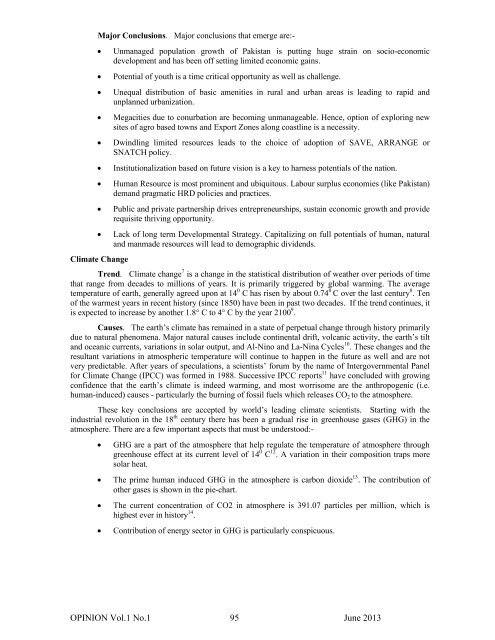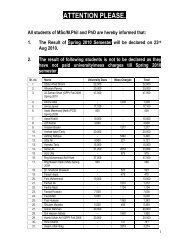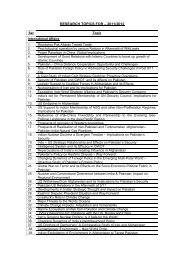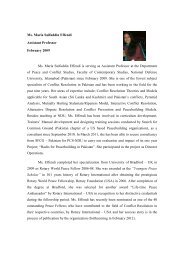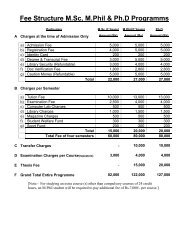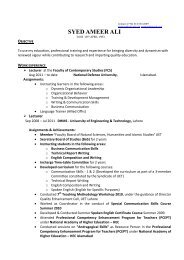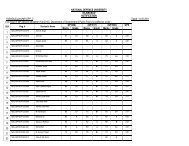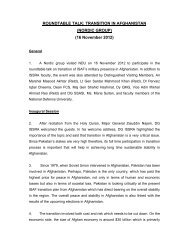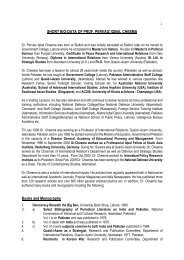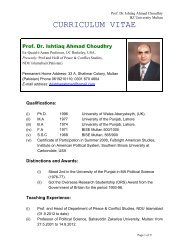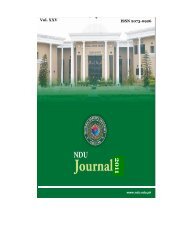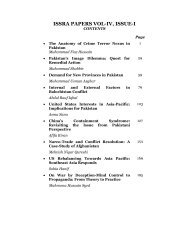OPINION Vol.1, No.1 June 2013 - National Defence University
OPINION Vol.1, No.1 June 2013 - National Defence University
OPINION Vol.1, No.1 June 2013 - National Defence University
You also want an ePaper? Increase the reach of your titles
YUMPU automatically turns print PDFs into web optimized ePapers that Google loves.
Major Conclusions. Major conclusions that emerge are:-<br />
<br />
<br />
<br />
<br />
<br />
<br />
<br />
<br />
<br />
Climate Change<br />
Unmanaged population growth of Pakistan is putting huge strain on socio-economic<br />
development and has been off setting limited economic gains.<br />
Potential of youth is a time critical opportunity as well as challenge.<br />
Unequal distribution of basic amenities in rural and urban areas is leading to rapid and<br />
unplanned urbanization.<br />
Megacities due to conurbation are becoming unmanageable. Hence, option of exploring new<br />
sites of agro based towns and Export Zones along coastline is a necessity.<br />
Dwindling limited resources leads to the choice of adoption of SAVE, ARRANGE or<br />
SNATCH policy.<br />
Institutionalization based on future vision is a key to harness potentials of the nation.<br />
Human Resource is most prominent and ubiquitous. Labour surplus economies (like Pakistan)<br />
demand pragmatic HRD policies and practices.<br />
Public and private partnership drives entrepreneurships, sustain economic growth and provide<br />
requisite thriving opportunity.<br />
Lack of long term Developmental Strategy. Capitalizing on full potentials of human, natural<br />
and manmade resources will lead to demographic dividends.<br />
Trend. Climate change 7 is a change in the statistical distribution of weather over periods of time<br />
that range from decades to millions of years. It is primarily triggered by global warming. The average<br />
temperature of earth, generally agreed upon at 14 0 C has risen by about 0.74 0 C over the last century 8 . Ten<br />
of the warmest years in recent history (since 1850) have been in past two decades. If the trend continues, it<br />
is expected to increase by another 1.8° C to 4° C by the year 2100 9 .<br />
Causes. The earth’s climate has remained in a state of perpetual change through history primarily<br />
due to natural phenomena. Major natural causes include continental drift, volcanic activity, the earth’s tilt<br />
and oceanic currents, variations in solar output, and Al-Nino and La-Nina Cycles 10 . These changes and the<br />
resultant variations in atmospheric temperature will continue to happen in the future as well and are not<br />
very predictable. After years of speculations, a scientists’ forum by the name of Intergovernmental Panel<br />
for Climate Change (IPCC) was formed in 1988. Successive IPCC reports 11 have concluded with growing<br />
confidence that the earth’s climate is indeed warming, and most worrisome are the anthropogenic (i.e.<br />
human-induced) causes - particularly the burning of fossil fuels which releases CO 2 to the atmosphere.<br />
These key conclusions are accepted by world’s leading climate scientists. Starting with the<br />
industrial revolution in the 18 th century there has been a gradual rise in greenhouse gases (GHG) in the<br />
atmosphere. There are a few important aspects that must be understood:-<br />
<br />
<br />
<br />
<br />
GHG are a part of the atmosphere that help regulate the temperature of atmosphere through<br />
greenhouse effect at its current level of 14 0 C 12 . A variation in their composition traps more<br />
solar heat.<br />
The prime human induced GHG in the atmosphere is carbon dioxide 13 . The contribution of<br />
other gases is shown in the pie-chart.<br />
The current concentration of CO2 in atmosphere is 391.07 particles per million, which is<br />
highest ever in history 14 .<br />
Contribution of energy sector in GHG is particularly conspicuous.<br />
<strong>OPINION</strong> <strong>Vol.1</strong> <strong>No.1</strong> 95 <strong>June</strong> <strong>2013</strong>


